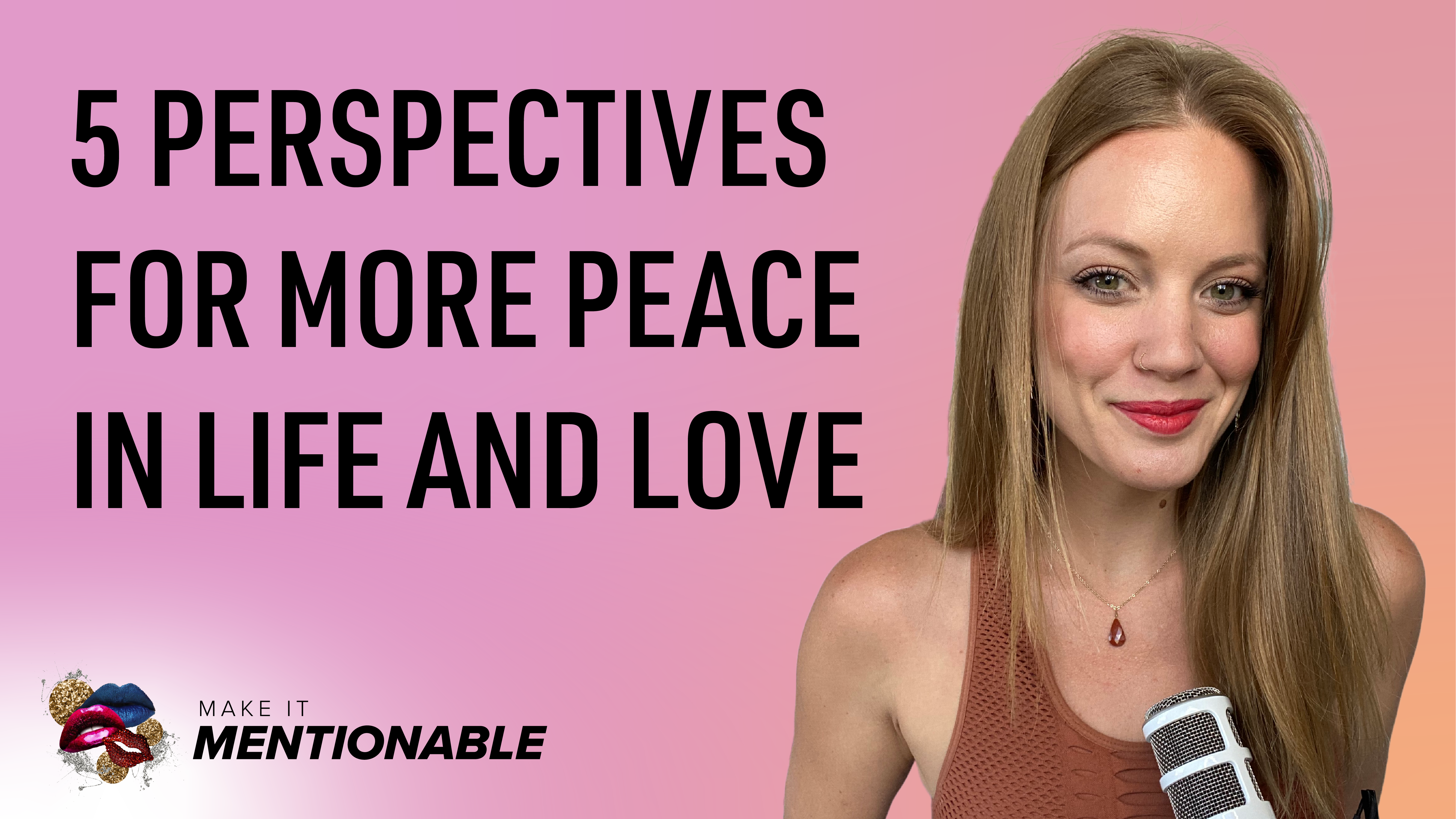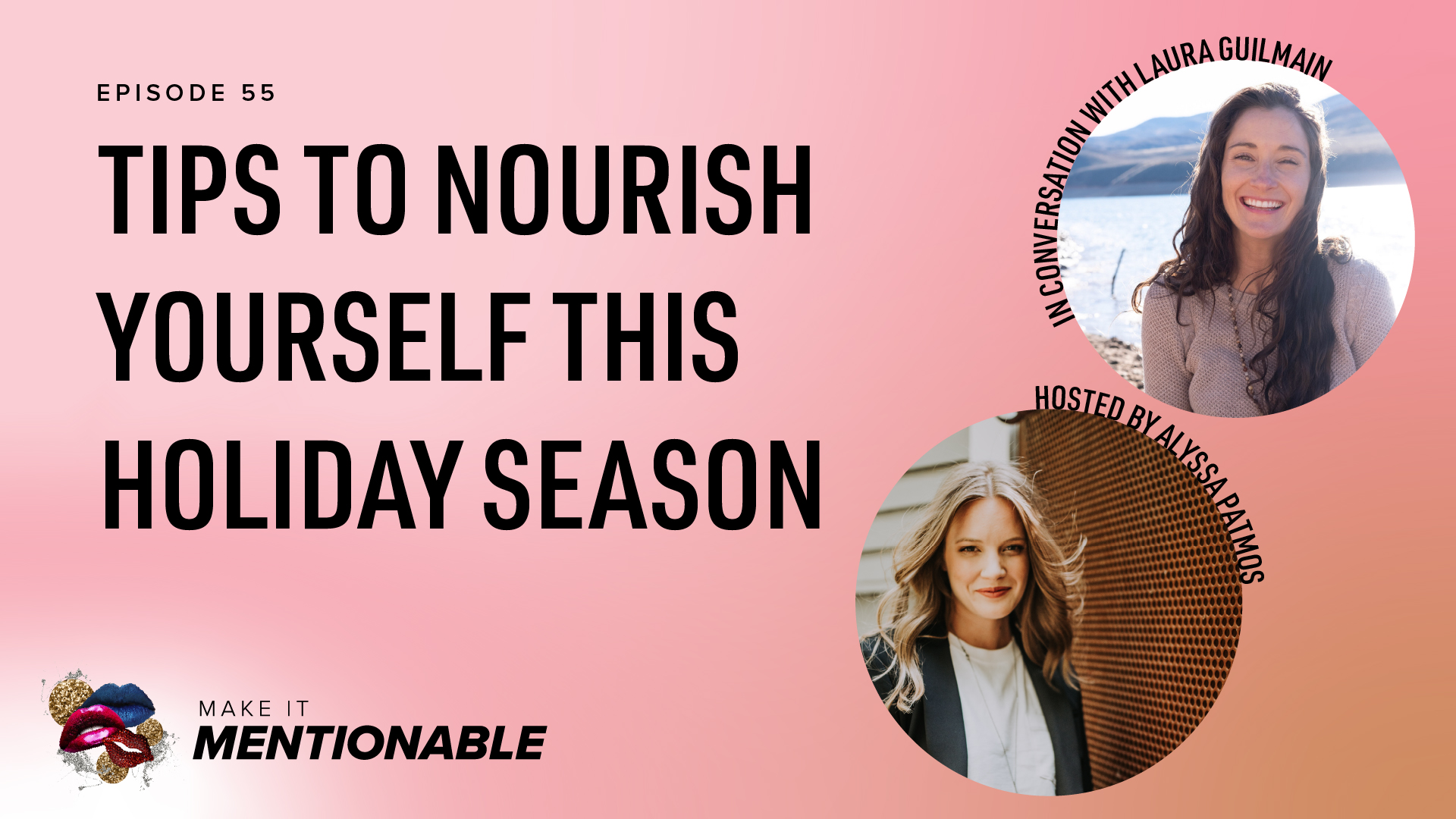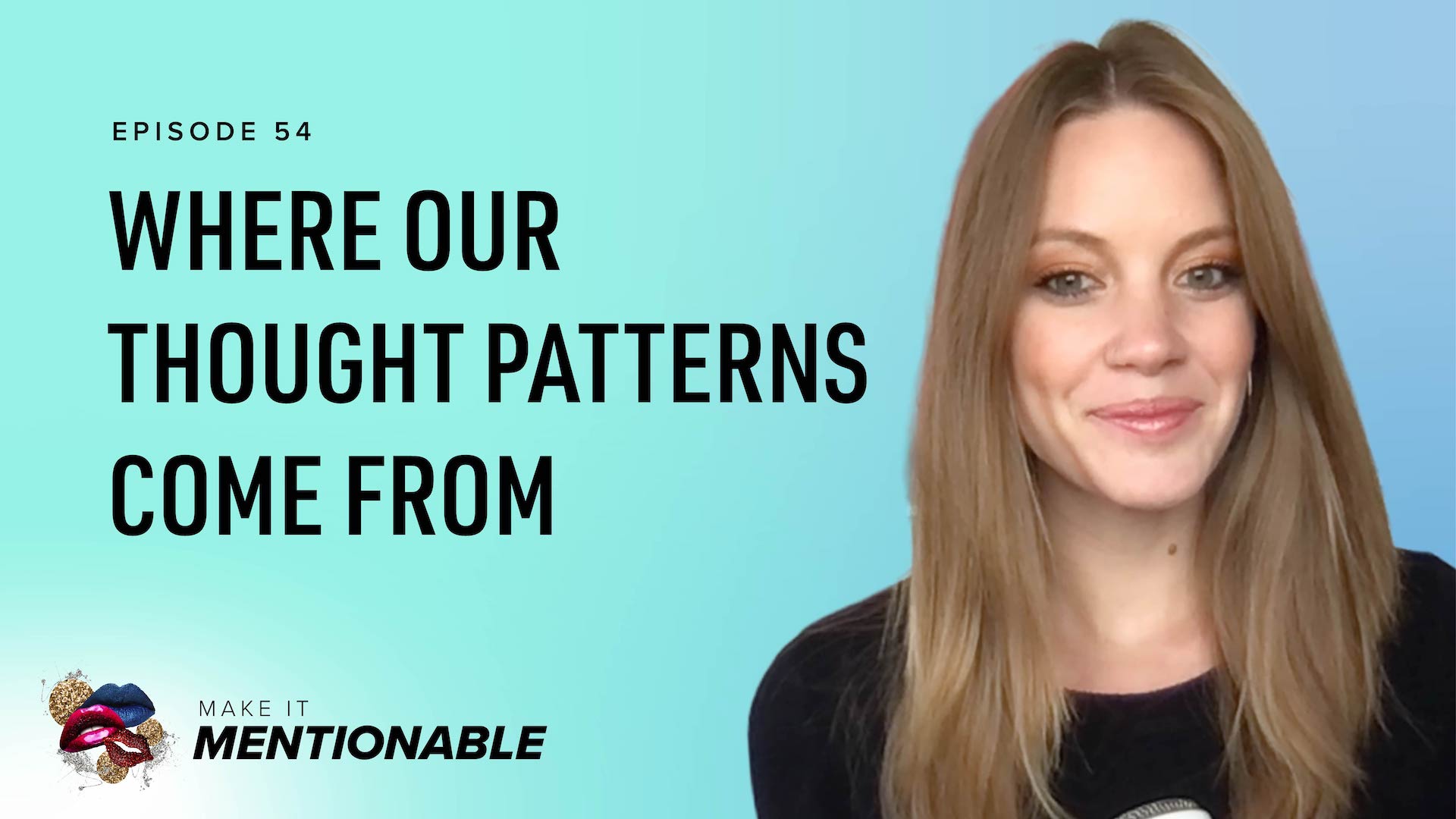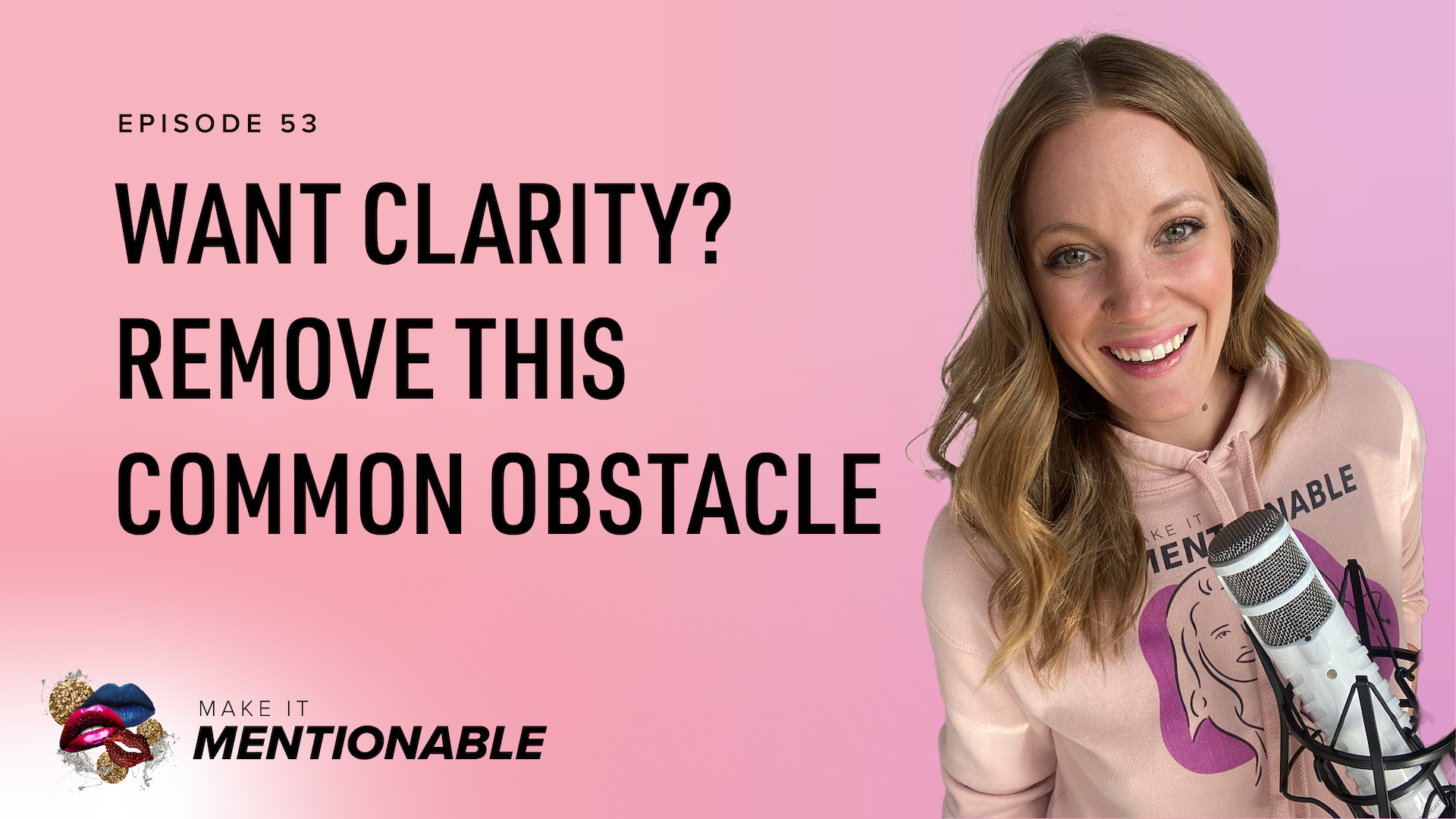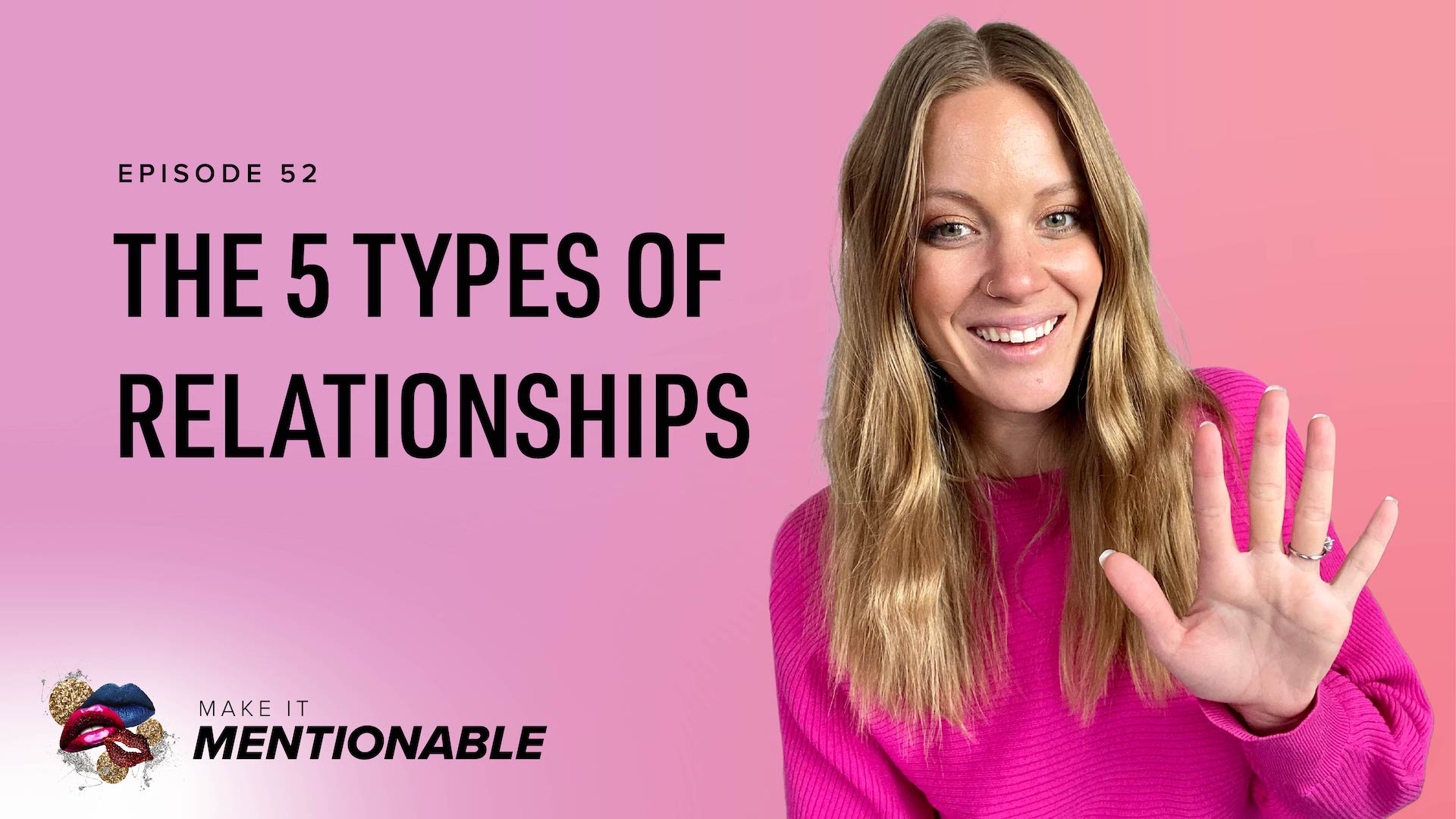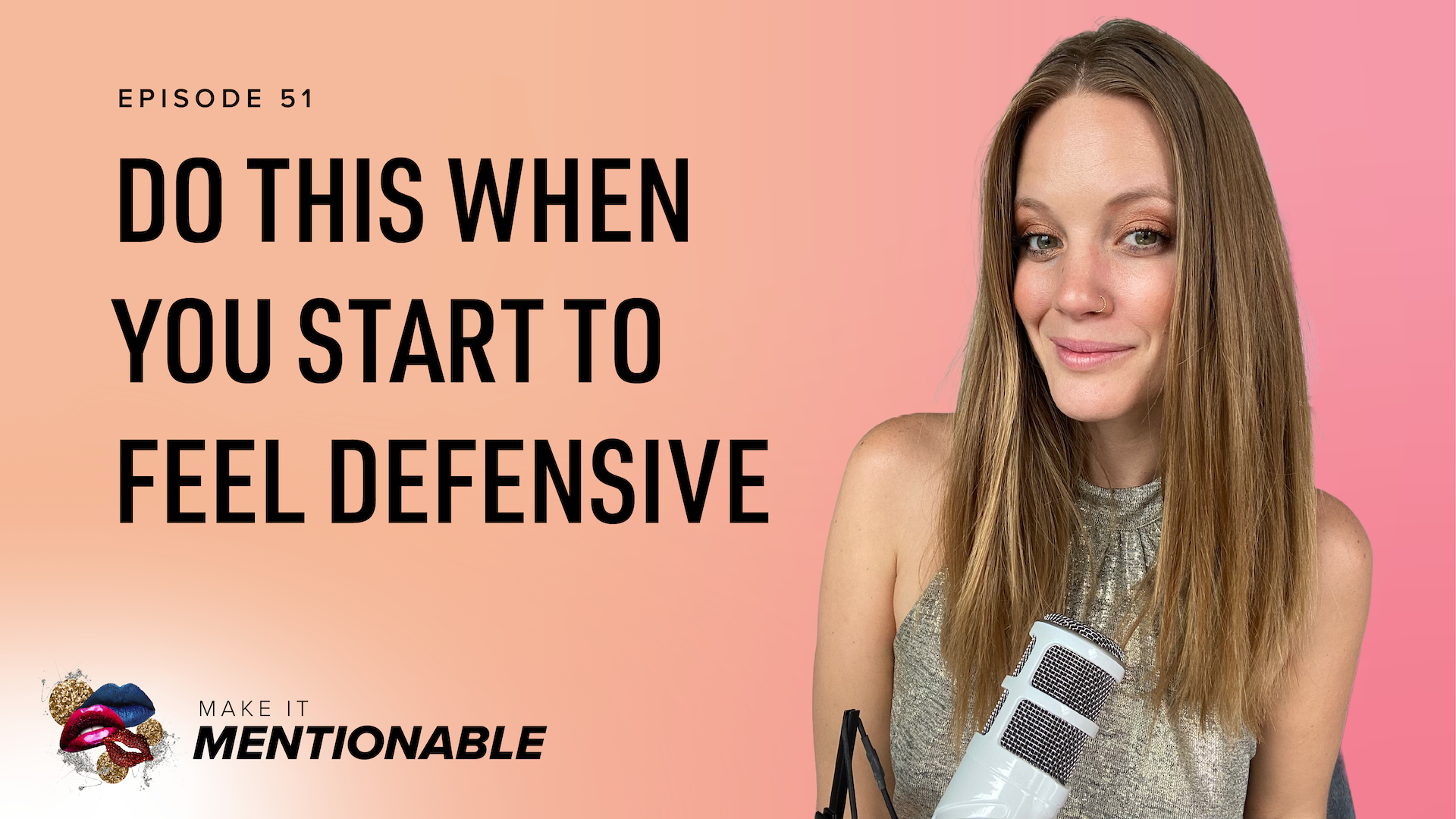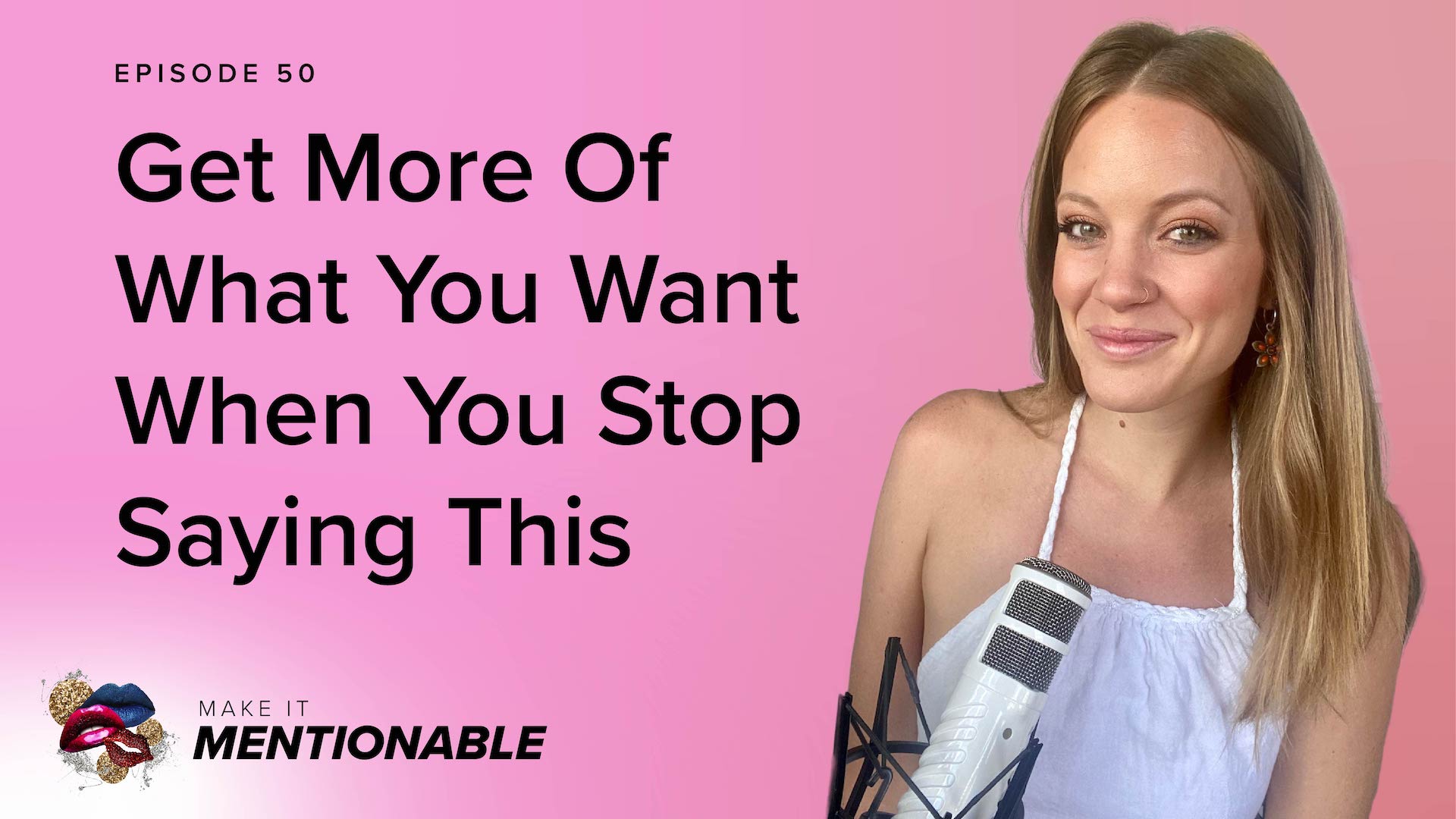Alyssa Patmos 0:04
This is Make It Mentionable.
I’m Alyssa Patmos and this is the show about being human in a world that encourages us to be robots.
I invite you to join me as we journey through the mess, the magic, and the mania in between.
Because what we can talk about, we can manage.
This honest conversation extravaganza includes free-flowing conversations and high doses of vulnerability to remind you that you aren’t alone.
No topic is off-limits, and episodes are designed to leave you smarter, aka more self-aware than when you came.
I am so glad you’re here.
How To Get The Inner Peace And Calm You’ve Been Craving
Hello, Hello.
And welcome back to another episode of Make It Mentionable.
I’m your host, Alyssa Patmos.
And today, I’m coming to the conversation with five perspectives that lead to more peace in life and love.
Because we all want more peace, right?
That coveted sense of of inner peace, where things just roll off our shoulders more easily. And where you know, we don’t have turmoil constantly in relationships.
We All Want Peace And Less Chaos, But How Do We Get It?
And it becomes a question of like, okay, how do we how do we get to more peace then?
And one of the simplest things, the simplest beliefs that I think many of us intuitively know, but it’s not always at the forefront of our insight is that our, our reality is shaped by our perspective, by the lens that we put on situations by the way, we filter our experiences.
And so the beauty of that is that sometimes it just takes a perspective shift to change a pattern.
It Comes Down To Changing Your Perspective
And when we change patterns, we experience self-liberation, which leads to freedom.
And so, and there, there, we find more peace, when we can change patterns, we find more peace, because it’s not the same things holding us back holding us down.
We’re not locked into one way of being.
And so the beauty of the fact that our reality is created from our perception is that perspective shifts hold a lot of power, then because sometimes it just takes one perspective shift to completely transform a situation.
And so I have five perspective shifts today.
Start With These Five Perspective Shifts
And I’m giving five, because, because sometimes you just need to hear things in a particular way.
And so all of these play together, and form a system nicely, but in their individual components as well.
It’s just different ways of hearing similar information.
And this always makes me think of a story.
Someone told me once about about how they were considering going keto, and their partner had been telling them about keto for years and years and years because he ate Keto and, and she was kind of on board kind of not.
But then she went to the seminar, and she heard someone else talk about keto. And she comes home and she’s like, I’ve heard about this thing. Like, I’m gonna go, I’m gonna go keto. I’m committed. And the partner is like, I’ve been telling you this for years. And then she was just like, Well, I heard it differently.
‘I heard it. I heard it differently this time. And now I’m convinced.’
And this happens all the time, because we’re not ready to integrate information until we’re ready to hear it or until we want to use it or we’re ready to make that change.
And so sometimes just hearing things in different ways, can be enough to unlock a new perspective.
Perspective 1: Changing What Happens After We’re Triggered
All right, so perspective number one.
The core principle behind this one, we’re dealing Oh, also, I love alliteration.
So these each come packed with alliteration.
So perspective, number one is around the concept of getting triggered because when we get triggered in relationships, it totally disrupts peace in the relationship and it can totally disrupt peace in our day.
I think there’s an assumption like in ideal land, no one ever triggers us. And so a lot of times we can end up putting the responsibility of never getting triggered on to our partners on to people we’re in relationships with.
But that is not that is not an approach to that sets anyone up for success. Because the other person cannot possibly guess what’s going to trigger us.
They don’t know our experiences. They don’t know how we’ve interpreted things throughout our life.
They don’t know what words people used against us in the past and why we’re sensitive to them.
And so expecting someone else not to trigger us, means we’re setting them up for failure. And we’re setting ourselves up for failure.
I talked to someone this week who, you know, they were asking me a question about their relationship.
And they were like, well, I mean, I don’t want to trigger her, I don’t want to upset her. And is really the goal should that really be the goal in relationships, because again, when conflict is handled with compassion, it can lead to greater intimacy.
If we never upset someone, we’re not learning about the intimate, the intimate parts of them that formed coping strategies for how to deal with life.
And, and it’s inevitable that we are going to upset people, it’s inevitable that at times, we’re going to trigger someone because again, we don’t know the complete ins and outs of how they operate in the world.
Getting Triggered Is Normal, But It Doesn’t Have To Create Turmoil
And so when we get triggered, it can often lead to turmoil, because then we have expectations of someone else, like we want it to go away, when we get triggered, you know, we can just feel this intense emotion, and it can feel overwhelming, and we just want it to go away.
And so if it feels like a tsunami internally to us, then it’s likely we’re going to create a tsunami in the relationship, because when we get triggered, when turmoil comes up, it can either flow in and out gently like the tide, or it can end up being a tsunami.
And the piece, the piece that determines which one of those it is, often comes down to awareness. And if we’re able to identify a timestamp, of why it feels so strong, where is this intense emotion coming from? When turmoil arises, and we feel triggered?
If we can stop and and find the timestamp of like, where is this coming from?
When You’re Triggered, Stop And Ask: Why Does This Feel Familiar?
Why does this feel familiar? We can totally transform the way that that conflict unfolds.
And again, relationships are made or broken, by the way that we move from rupture, to repair, to have to anytime a couple says, Oh, we never fight, or we don’t really get into conflict, I get so nervous, because it usually means that one person is suppressing something, or maybe both people are suppressing something.
Conflict is not something to be avoided. But it’s something to get better at.
If it’s inevitable, then let’s get better at handling it.
So the first perspective is, okay, if I get triggered, what’s the timestamp? If I’m getting triggered? What’s the timestamp?
And you know, the other thing that happens?
I find that when I talked about these perspectives, the other, the other thing that can happen is we instantly want the other person to be better at it.
So it’s like, Oh, hey, I learned this thing today, like, Okay, you’re getting triggered was the timestamp, where’s it coming from?
And we want the other person to all of a sudden do it perfectly.
But sometimes we have to model it first. And it usually works better if we address it in ourselves first. So it’s like, Okay, I’m getting triggered. Where’s the timestamp? Where does it feel familiar.
And when we can allow ourselves to do that, we’re truly showing ourselves compassion, and and when that gets integrated into our body, when we actually begin to understand what it feels like to experience self compassion, we become so much better at offering that to someone else.
So perspective on number one, for more peace is okay, when I get triggered, what’s the timestamp?
When turmoil comes up? And I feel triggered? What is the timestamp? Where is this coming from? Why does it feel familiar? When does it feel familiar?
And when we can cultivate that awareness there, we’re better able to move through the turmoil.
Which brings me to perspective number two, again, packed with alliteration, because alliteration is fun.
Perspective 2: Ask For Awareness Rather Than Accommodation
So when it comes up the other thing that we tend to do, like if we get triggered, the other thing that we tend to do is ask for accommodation, like ‘you’re triggering me, please stop’.
Like, why did you ask me that right now? And we want someone to never do that thing again. Because the intense emotion comes up. And it can be it can feel so intense. And we don’t want to feel that way.
And so the instant reaction is to is to ask the other person to not do it or to to do something in a different way.
The problem with this is then it’s like we create this inevitable rulebook where it’s like, okay, the other person then has to keep track of, in this situation, I can’t do this, and I need to do this instead. And in this situation, I need to do this, and then it becomes this like rulebook of, of accommodations.
The problem with that is that inevitably, the next time that situation comes up, what we’re going to need is slightly different, because ultimately, the situation is arising, so that we can address what’s underneath so that we can figure out what’s going on what’s underneath and heal it and unwind the wound, we end up getting in situations where we unintentionally wound the relationship or wound another person, metaphorically speaking, because we haven’t taken the time to unwind our own wounds.
And so in those situations, where there’s triggers coming up, we have turmoil.
Oftentimes, the first thing we want to do is ask for an accommodation, like accommodate me accommodate my needs accommodate this like unspoken trigger I have here so that this intense emotion goes away.
Awareness: Your Secret Superpower And The Key To More Compassion
So the perspective shift here, is to go from accommodation, to awareness. And I’ve said this time and time again, but awareness is a superpower. And it’s a vehicle to greater compassion.
Because there’s a huge difference between asking someone to accommodate these needs and creating this rulebook that becomes miles long, because there’s a different way that we want it done every time it comes up, versus cultivating a sense of awareness, where it’s like, oh, goodness, I am triggered.
What is the timestamp? And what awareness do I need to have about this, finding the timestamp is an element of awareness.
But if we can be aware, and a situation of where something is coming from the beauty on the other side of that is we can have more appreciation, we can have more appreciation for ourselves, and why we’re having this reaction.
Because honestly, who is proud of themselves after they completely just react in go into reactionary land and spiral down.
And, you know, we’re not always proud of ourselves for the way that we engage in conflict at times. And so when we can cultivate this sense of awareness and recognize all pads where this is coming from, like, I hear this word, and I just think of my mom, or I hear this word, and I just think of this coach who used to be so hard on me.
And now I’m super hard on myself in the same way, when we can cultivate that awareness, we can also have an appreciation for how things have unfolded and why they’re like that, and then we can choose to align in a new direction.
And one of my favorite definitions of appreciation is having sensitive awareness.
And I just love that because we talk about awareness all the time, but but the appreciation that comes from awareness is that is that is the sensitivity piece, it’s it’s being able to see the other person and see ourselves with a sensitive awareness. And that allows for more compassion.
So perspective number two is moving from, it’s truly moving from accommodation and asking for a combination to alignment in a new way.
And, and alignment allows for the other person to help us get our needs met. But it doesn’t put the entire expectation on them in the same way that accommodation does.
So instead of just asking for accommodation to get rid of those intense feelings, when turmoil comes up, when we get triggered, the perspective shift is to hold awareness. So again, it’s finding that timestamp, but awareness and other ways to just noticing what you’re feeling in your body.
And sometimes verbalizing that can shake up whether or not were were going into fight or flight mode, just holding space and allowing awareness like checking with your body. What are you feeling right now? Where might this be coming from?
Because from there, we can get into alignment in a new way of wanting to do things. And we can we can appreciate the nuances of ourselves and how we have gotten to this point.
And when we can do that for ourselves again, we’re better able to do it for other people.
So accommodation, how can we hold space and have awareness so that we can align and appreciate more about ourselves and, and about others?
And that restores internal peace and, and peace in relationships as well.
So the other word that came up when I was describing this perspective shift is reaction and reactionary land, which I talk about a lot.
So the third perspective shift. I’ve talked about this before it where we can either have a reaction, or we can respond to a situation.
And generally, response has awareness behind it, we’ve taken the time to become aware.
So if neither of these other two perspective shifts are working for you, maybe this is the one that will unlock it.
Perspective 3: When Turmoil Comes Up, We Can React, Or We Can Respond
So when turmoil comes up, we have two choices, we can react, or we can respond.
And a lot of times if if we’ve been triggered, and it’s like a tsunami, and it feels super overwhelming, the gut reaction, the gut instinct is just to react and to go with whatever comes up first.
And that’s how we can end up with like, verbal diarrhea and word vomiting all over people at times. So the reaction though, the goal is to go from reaction to response.
The Power Of The Pause
And one of the things that allows us to do that is the power of the pause, and just pausing.
And recognizing, okay, wait, do I actually want to have this, this reaction right now, the other thing that’s even more powerful than the power of the pause, like the pause is great for when that situation is live.
And it’s happening, and it’s right in front of you. And it feels overwhelming.
Power of the pause is amazing. Because it gives you the space to start to recognize what’s going on and feel what’s happening in your body and make a choice for how you want to respond instead.
But the other thing is, reactions happen.
And reaction cycles happen, like have you ever noticed where you get into conflict, and it’s just like, the same thing seems to be happening every time even though you feel like you’ve talked about this before, maybe your partner responds in the same way or reacts in the same way every single time and it drives you nuts.
And, and that tends to happen when we ignore the root.
And this goes back to the definition of conflict being an unmet need poorly expressed, when we when we ignore the underlying need, when we ignore the root of where something is coming from or what the need is, or, or maybe the person didn’t feel completely understood the time before, when we ignore all of those things.
Reaction is more likely than an aware response, when we can tap into the root of the issue and remember that very, very rarely is turmoil about what is happening exactly.
Then in there, on the surface. Everything is black and white. This is what happened. And this is what’s unfolding.
No, it’s rarely that turmoil often carries all the weight from things in the past, and our interpretations, our understandings of how we had perspectives in the past and what that led to, and now we’re making decisions about it because we feel safe or not.
If we ignore the root, we end up in reactionary land, if we can embrace the root and recognize that it is not just about what’s on the surface, there are things underneath the surface that are adding to this turmoil right now, then, we can take a breath, we can breathe, power of the past, and we can allow ourselves to step into, okay, if all that stuff wasn’t true, what would this situation in the present now look like?
And how do I want to respond.
So to go from reactionary land to a response, we got to recognize the root, we got to recognize that that the situation holds more than just what we’re seeing on the surface, you got to go below the surface to the roots and and see what is there.
And you know, sometimes you can do that together, sometimes you do it on your own and then come back later and have a more productive conversation.
So perspective three is to stop this barrel of reactionary land and go to response, we have to recognize the root because if we ignore the rule, if we ignore the unmet need, if we ignore, if we ignore someone’s past experience that has led to to this reaction, it’s going to be much harder to get to response.
And a place where both people are responding instead of reacting is where more peace comes from.
All right.
So the next one, the next perspective is, is around blame.
Perspective 4: Throw Blame Out The Window
Because the other thing we do, when turmoil comes up, we can either, you know, instantly want someone to accommodate us.
But the other thing that can happen is we can we can put out blame, or someone can blame us similarly for, oh my God, Who are you to trigger me on this right now? Like, who are you to do this?
And when we throw out blame, it’s like, Why? Why are you doing this to me right now.
And in that moment, it feels like, everything is being done to us.
And we kind of forget that situations arise for us, so that we can unwind wounds.
And, and what we want is to move from blame, to feeling like it’s a blessing to feeling like, oh, I feel free of like repeating this pattern again.
And that middle piece, the middle piece here is recognizing that there’s, there’s actually an underlying blueprint. And it’s taking the time to recognize and cultivate awareness around how is something made.
If someone is throwing a huge amount of blame at us, something is going on internally. And so again, not our responsibility to fix the trigger for someone, but we can be compassionate and help them help them see hold space for them to understand what is going on.
And so, again, it conflict is this dance between monitoring our own internal experience, and then also being able to have compassion for the fact that someone else has this entire internal experience going on as well.
What’s Bringing Blame Into Your Conflicts?
And so to go from to go from blame to Oh, what if this was a blessing? We have to be willing to explore the blueprint.
And recognize, okay, how is this situation being made from both sides, that’s the powerful part because it’s not just, it’s not just me meeting the other person to to understand my experience, the closeness can come from when both people feel heard and understood, and when from when both people’s experiences are taken into account.
So it’s a blueprint for how to go forward, but it starts with how was this made, and that’s what blueprints do, you know, they’re diagrams detailing how something was made.
And so if you can start to explore the blueprint of how this situation is being made, especially if it’s a situation that repeats itself in your relationships over and over again, it will be much, much easier to get to the part where it’s a blessing.
So blame, what’s the blueprint?
How is this a blessing, because conflict, again, it’s not there, to ruin your life, or to ruin your relationship, it can, if we don’t hold it with compassion, but ultimately, conflict is is a vehicle for deeper understanding and for closeness, if handled with compassion.
And so ultimately, if you’re committed in any sort of relationship, whether it’s with a friend, whether it’s, you know, even a work relationship, the, the level of seriousness might be different.
But But even in those relationships, it becomes important to recognize, okay, this is to humans with their own inner worlds reacting and responding, what is what is the blueprint? How is this being made?
What are both of us bringing to this situation, and recognizing that alone can be a blessing because it allows you to have more compassion in the relationship and transform blame into something much more much more beautiful.
All right, perspective number five is here.
So this entire time, you know, we we have been talking about what happens during turmoil, and it can either be like the tide or it can be like a tsunami.
And generally, if it’s like a tsunami, if it feels like a tsunami, our defenses are going up.
Perspective 5: Defensiveness Or Discernment
And so the fifth perspective is, do we want to be defensive or do we want to be discerning? And defensive when we get defensive, it puts a wall up between between us and the other person. And really conflict is is handled with care.
Treating Conflict As Something Outside Of Your Relationship (And Not Your SO’s Fault)
It’s it’s it we can move from rupture to repair more easily if conflict is like object C over here.
So there’s Person A, and there’s Person B, and person A and person B are working together, we need to be working together and looking at this thing called conflict, which is over in front of us as object C, when conflict becomes you versus me, it’s much harder to unwind.
And so when we get defensive, it transforms the situation into Person A versus Person B, instead of person A and person B, looking at this thing that has popped up objects see conflict.
And so the thing that we can do here, the perspective shift here is rather than be defensive, I can be discerning.
And I can discern, okay, is this maybe you know, you’re arguing over the dishes, or you’re arguing about picking something up over that in the house, like these trivial things that come up and press buttons?
Is Your Fight Ever Really About The Dishes?
And it’s like, Wait, okay, I’m being defensive. Is it truly about this? Is it truly about the toothpaste cap? Is it truly about taking out the trash? Is it truly about putting the laundry away? Is it truly about the fact that your kids didn’t pick up the dog poop this week?
Probably not.
And so being able to discern what is underneath, identifying what is the unmet need, being able to discern, why am I feeling this way?
What do I need to express? What is the underlying need for them, or for them?
If someone else is being defensive with you being able to discern, okay, there’s an underlying need here, what what might that be and asking, when we can discern, we can get curious and discern instead of getting defensive, we will experience more inner peace, we will experience more peace in our relationships and turmoil will go in and out more like the tide, rather than feeling like a tsunami, every time.
And ultimately, that helps us go from rupture to repair. And it cultivates relationships where we feel safe.
And so it’s not like we need someone else to provide safety for us all the time.
Pivot Your Perspectives To Feel Safe In Your Body And In Your Relationships Again
Because we know how to restore safety, we know how to feel safe in our own body and in in the relationships around us.
And if someone is incapable of meeting you, in some of these places, you can set a boundary and you can determine that maybe that relationship isn’t one that you want to be involved in anymore.
Or maybe you need to speak up clearly around how you’re going to interact with someone.
And so it can either provide more safety, or it can provide you and show you the areas where you can stand up for yourself and set better boundaries.
Both scenarios lead to more inner peace. So recap, the five perspectives full of alliteration.
Recap: Five Perspective Shifts For You
When we get triggered, when turmoil comes up, and we feel triggered, it can be like the tide going in and out or it can be like a tsunami.
And when we get triggered, the best thing we can do is identify the timestamp.
Where’s this coming from? Because it is rarely the thing that is just on the surface. So why does this feel familiar? Where is it coming from?
And perspective number two, when we feel like God, we just want someone to accommodate us right now and just accommodate the fact that I am uncomfortable, will you please just do this differently?
We can instead cultivate awareness and recognize, okay, again, where is this coming from, because then we can align on a new course of action and we can appreciate ourselves more, which is such a such a gift, we can learn to appreciate ourselves more and how we got here, instead of just being so harsh on ourselves and feeling like you know, we need to have be perfect all the time.
We are human after all.
And when we can do that for ourselves, we’re so much we have so much more capacity, we open up the capacity to do it so much better for someone else.
The third, the third perspective was reaction or response.
And the key thing here is are we ignoring the root because if we ignore the root, we stay in reactionary land, but if we can embrace the root and, and search for it and and go to the land down under where roots grow, we can we can respond.
And you know, we don’t end up with root rot, where things are just rotting from the inside out without us realizing it.
That’s what can happen if we live in reactionary land and ignore the root.
So when we embrace the root, we can go to a place of response and cultivate more closeness and peace in relationship Oops.
The fourth one is blame.
And just blaming someone else for bringing up conflict rather than realizing health be a blessing for me, how might this be a blessing in disguise for me, and the thing that can help us move from blame to blessing, feeling like it’s a blessing is the blueprint and working together and understanding?
How is this being made? Hmm.
Like, how is this situation that we seem to be getting ourselves into, consistently about the dishes about about, you know, how we spend our time, how we, how we engage and communicate on a project?
How is the situation being made? What is the Blueprint here? And what changes might we want to make?
And the last perspective, perspective, number five is around defense, or discernment.
We want to be defensive, or do we want to be discerning, still maintain discerning is such a sexy word because it it means that we’re showing up with an awareness and the ability to to decide, rather than just getting stuck in a defensive spiral where we’re just feeling the need to protect ourselves.
So that last one is defense or discernment and being able to recognize what’s happening in the situation and, and even just pausing in ourselves and discerning Okay, wait, this is this is a fight or flight response.
This is a gut reaction, this is me feeling defensive and feeling like I’m putting a wall up.
And when we can discern these things, when we can just allow for certain sensations to happen in our body and not even assign meaning to it yet.
We lower our defenses we lower the knee and to have like that reaction come up immediately. And that leads to more peace in relationship.
Your Assignment: Practice Cultivating Awareness
And again, all this is is a practice it’s it’s it’s cultivating that sensitive awareness and ability to appreciate how we got here, how we made these choices, what led us to this place and then deciding do we want to continue down that path?
Or do we want to do it in a different way?
So these perspectives can serve as pattern busters so you can experience more peace.
And if one of these perspective shifts really resonated with you, I would love love, love to know in the comments.
—————————-
You’ve just finished listening to another episode of Make It Mentionable with me, your host, Alyssa Patmos.
If you’re looking for more in between episodes, then sign up for The Peel.
It’s my free newsletter that gives tips for how to navigate whatever life dishes and it’s also the place where I share the juiciest of stories.
To check it out, head on over to AlyssaPatmos.
com/ThePeel.
Thank you so much for tuning in, and I’ll see you next time.
Transcribed by https://otter.ai
[outro music plays]

